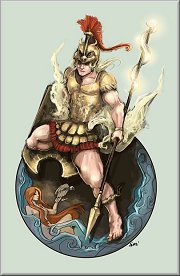
ARES
CLICK TO ENLARGE

ARES
CLICK TO ENLARGE
|
ARES PAGE TWO
MUCH
MORE ARES INFO COURTESY OF THOMAS GANGALEE
The
origin of the name is uncertain. Possibly, along with Mars, it
is connected with the Sanskrit mar and the Vedic maruts, meaning
"storm divinities", or the Greek root meaning "to carry away".
The Spartans called him Ares Enyalios (the warlike), while in
Olympia he was known as Ares Hippios, god of horses.
ORIGIN AND CHARACTER
Until
their absorption by Rome, the Greeks never achieved lasting
political unity, and consequently warfare was endemic among the
Hellenic and Hellenistic states. The Romans considered that the
Greeks not only loved fighting among themselves but delighted in
drawing foreign powers -- especially Rome -- into their petty,
interminable feuds.
It is interesting that although war was so ubiquitous in Greek
history, it was never glorified in the form of a popular and
noble war god. It is as though the Greeks sensed that their
ungovernable passion for war was their own undoing and the
basest aspect of their national character.
It is of course very difficult to admit one's flaws in so
straightforward a manner, and so it was natural for the Greeks
to externalize this self loathing in the form of a despicable
war god and even lay the blame at his feet.
While Christian nations have often warred among themselves, and
the belligerents have prayed to the same god throughout, war has
never been Jehovah's business but humanity's folly. However, war
was quite obviously the trade of Ares.
Of course, there was no reason for the Greeks to believe that
Ares consistently championed a particular city-state, for
history had amply demonstrated the vicissitudes of war, so again
it was natural for them to regard him as a fickle god who
enjoyed bloodshed for its own sake, one who would back any side
in a war regardless of the justice of the cause.
To the Greeks, Ares was the most evil of the gods, the
animal-warrior, the embodiment of primitive rage and
unquenchable bloodlust, a wonton and savage butcher.
WORSHIP
Little is known about the worship of Ares, who may have been a
Thracian god before he was adopted into the Greek Pantheon. His
cult was particularly strong among the barbarous and warlike
peoples of Thrace and Scythia, but "the maniac, the dunce, the
bane of all mankind" apparently did not receive much attention
in the more civilized parts of the Greek world.
Strangely though, this bitter enemy of Athena had a temple in
Athens. Also, a spring was consecrated to him in Thebes.
It is said that before engaging the enemy, Greek armies would
send a torch-bearer, who was thought to be under the protection
of Ares and therefore inviolable, into the field between the two
hosts. He would toss his torch in front of the enemy lines to
disperse the spirits of their warrior ancestors.
ARES CONTINUES ON PAGE THREE
LOTS MORE ARES STORIES AND PIX
CLICK HERE!

|







